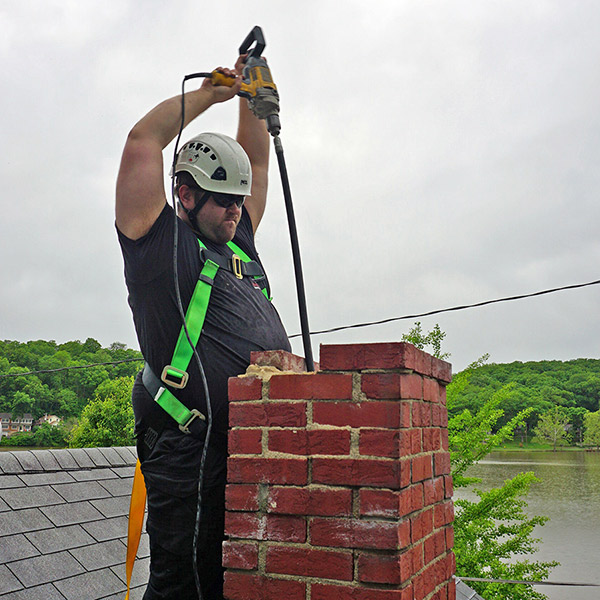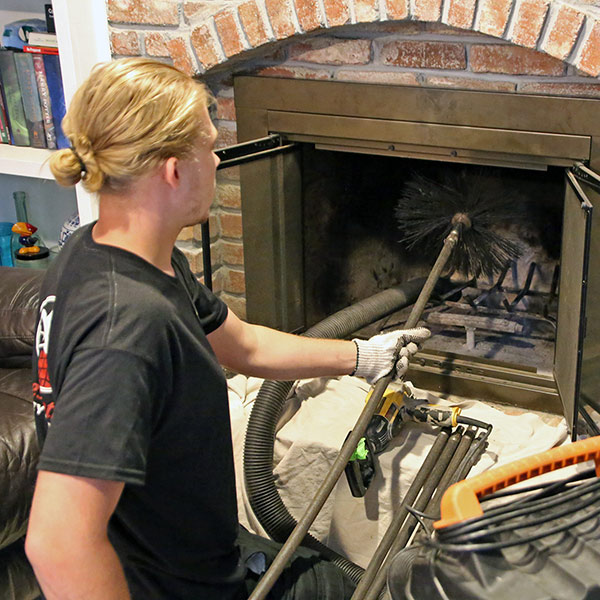5 Reasons Why Sweeping Your Chimney Is Important
While you’re enjoying the warmth of a wood-burning or gas fireplace, the chimney is expelling smoke, toxic fumes, and other organic matter to keep your family safe. When the chimney lacks regular sweeping, many potentially dangerous substances continue to accumulate in the flue that can interfere with its ventilation. It can also affect your health and safety, reduce heating efficiency, and increase chimney repair costs.
 Minimize Fire Risk
Minimize Fire Risk
The combustion process of lighting your wood-burning fireplace, and to some extent, gas fireplaces as well, produces several chemical compounds, including creosote. In its initial stages, creosote is a relatively inert powdery substance that is easily removable with regular chimney sweeping. However, it evolves into a thick, tarry, and highly flammable substance as it continues to accumulate without regular chimney cleanings. Excessive creosote in the chimney is the primary cause of residential structure fires.
Prevent Carbon Monoxide Poisoning
Without periodic chimney cleaning, the creosote, soot, and other particulates that build up in the flue increases the risk of exposure to carbon monoxide (CO) fumes when using the fireplace. Small animals, leaves, and twigs can also obstruct the flue compromising its ventilation. Carbon monoxide is a colorless, odorless, and tasteless gas that can cause headaches, nausea, dizziness, and even death. More than 4,000 people are hospitalized every year due to carbon monoxide poisoning, according to the Centers for Disease Control and Prevention (CDC). Fire safety experts recommend homeowners install a CO detector on each level of their home.
Reduce Chimney Repair Costs
Some of the combustion gases, such as sulfur dioxide and nitrous dioxide that stick to the flue, are acidic. Unless you clean the chimney, these corrosive gases will not only stain the flue and flue liner but can also cause severe masonry damage resulting in expensive repairs. It can also increase the risk of a chimney fire, which can cause excessive masonry damage and allow the heat to transfer to other combustible materials used in home construction.
 Remove Foul Odors
Remove Foul Odors
Poor ventilation is not the only factor in an unclean chimney. The decaying organic matter and other compounds in the flue can also cause foul odors. The unpleasant smell that starts in the chimney can permeate through your entire house. Since air fresheners will only temporarily mask the odor, a thorough chimney cleaning is the most effective remedy.
Increase in Heating Efficiency
A flue liner that is covered in soot, ash, creosote, and other material reduces the heating efficiency of the fireplace, which wastes energy. Also, the corrosive gases can cause cracks in clay tile liners, further reducing its efficiency.
Regular chimney sweeping is one way to increase heating efficiency and reduce energy costs.
Chimney Cleaning and Inspection
The Chimney Safety Institute of America (CSIA) and fire safety experts recommend homeowners with liquid or solid fuel heating appliances have annual chimney cleanings and inspections. Hiring a qualified chimney sweep is an economical and convenient way to ensure your chimney, fireplace, and other heating appliances are safe to operate.
The post 5 Reasons Why Sweeping Your Chimney Is Important appeared first on Fluesbrothers Chimney Service.